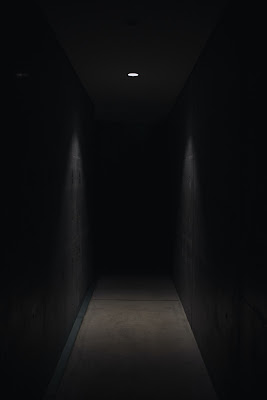A Door Into the Uncertain
Brief notes on dread
This post is a companion to Eugenia Triantafyllou’s "Dizziness of Freedom". Think about them as The Shining twins but made of words.
Come play with us.
#
Back in January 2022 when one of my short stories was published in Apparition Lit, I didn’t imagine that I’d be editing the January 2023 issue alongside my very dear friend and amazing author Eugenia Triantafyllou.
Apparition is a speculative fiction magazine working hard to publish great fiction, but also to create a more equitable and diverse publishing community. They’ve committed to work with guest editors to have different perspectives that expand their view of fiction.
Eugenia and me were beyond thrilled when the Apparition team agreed to embark us as co-editors for an issue with a theme very close to our hearts: DREAD.
 |
| Photo by charlesdeluvio on Unsplash |
I believe that writing this post as a form of anticipation is very pertinent because at the heart of the sometimes undefinable feeling of dread is anticipation itself. The certainty that something uncertain is about to happen, the possibility of possibility. It’s what Kierkegaard called the “dizziness of freedom” because dread resides in that exact point where we have the choice between the familiar and the appeal of the unknown. Dread is present when our feet are touching the edge of a cliff and we are terrified of falling, but also excited to discover what can be down there.
As a concept of liminality, dread is in the place where the ordinary turns into the uncanny like in Shirley Jackson’s “The Lottery” where a seemingly normal village prepares for this annual event. We as readers are curious of what the lottery entails, but this curiosity turns gradually into unease when we notice things that maybe shouldn’t be there: why are the children gathering stones? Why are the villagers so tense when drawing their pieces of paper? What is going to happen that we don’t know? Until we know.
Sometimes dread comes when an outcome we thought was very certain is subverted like it happens in Carmen Maria Machado’s “The Husband’s Stitch.” Readers familiar with the green ribbon story already know how this story will end, but they’re not ready for all the layers of meaning added to it. Because losing her head is not the greatest fear.
Dread can appear as a mechanism of survival to overcome those feelings of impending doom or danger. A woman who tries to regain agency over her own self by trapping the monster that’s tormenting her, even though we know that the real monster is a different one that remains free, like in “The Houseguest” by Amparo Dávila.
There is dread in distorted childhood memories, in the desire to go back to a place that made us happy but also took everything away from us. In Mariana Enriquez’s “Adela’s House” the shadows of memories grow longer and darker as we follow the story that happened years ago and still torments the narrator (and will torment the readers).
We feel dizzy when we put our hand on the doorknob of that house because we know what we’ll see, we’re sure we’ll get lost inside, we’re terrified of going in.
And yet we open that door.
#
Follow Eugenia and Apparition Lit to be up to date about publications and submission guidelines for DREAD!